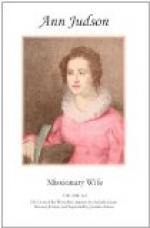Our labor of sketching the lives of the three distinguished women who were permitted to share the happiness and lighten the cares of one of the most worthy and venerated of missionaries, now brings us on delicate ground. The last wife of Dr. Judson, happily for her numerous friends and for his and her children, survives him. Long may she be spared to train those children in the ways of lofty piety, to gladden the wide circle of friends and relatives now anxiously expecting her return to her native land, and to gratify the admirers of her genius with the graceful and eloquent effusions of her pen. Graceful and eloquent they have always been, but of late—touched by a coal from that altar on which she has laid her best sacrifice, herself—they have gained a higher and purer flow, awakened by a holier inspiration. The world admired the brilliancy of “Fanny Forrester.” Christians love the exalted tenderness, the sanctified enthusiasm of Emily C. Judson.
Much as it would gratify us, and her friends to give an extended account of her life, delicacy forbids us to do more than merely to sketch those features in it, which are already the property of much of the reading public. Our outline will necessarily be meagre, but we will enrich it by several of her poems written in India, hitherto scarce published except in perishable newspapers and periodicals. We might indeed make it more interesting by incidents and anecdotes, drawn from those of her early associates who love to dwell on the rich promise of her childhood and youth; but by doing so, we should incur the risk of intruding on the sacredness of the family circle; and we forbear.
She was born in Eaton, a town near the centre of the state of New York. In her childhood, she exhibited an exuberance of imagination that enabled her to delight her young associates with tales, which, according to one of them, she would sit up in bed in the morning to write, and then read aloud to them. She would, even then, write verses also, but in this gift she was perhaps inferior to a sister, who died in early life, and whose numerous poems were unfortunately, and to the grief of her family, accidentally lost. At an early period she embraced religion and was baptized by the Rev. Mr. Dean, a missionary to China, then in this country. Her interest was awakened in the heathen, even at that time, and she indulged in many ardent longings to go as a missionary to them. The late Dr. Kendrick judiciously advised her to pursue the path of duty at home, and quietly wait the leadings and openings of Providence. This advice she followed, and as a means of improving the straitened circumstances of her family, she left home and engaged as a teacher in a seminary in Utica.




